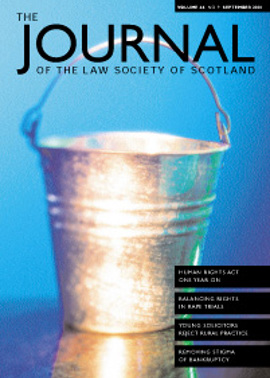President’s report
Practice Perspective
As a solicitor from a three partner rural practice I know the issues faced by similar firms. This Journal takes an objective look at practice outwith the major conurbations. Solicitors all have some choice available about areas of work, city or rural living, career plans and balancing work commitments with family and lifestyle decisions, but the reality is that sometimes accident rather than design takes us where we end up!
Rural practices are acutely aware that recruiting recently qualified solicitors can be difficult. The salary difference is widening, with city firms and the specialised companies offering more than many rural firms, and the range of skills and adaptability of the solicitors who thrive in my type of practice mean that it suits some people perfectly whilst others not at all. The decisions can be difficult but one of the advantages of being a solicitor in Scotland is that both private and in-house practice provide us with choices which allow us to tailor our career and our lifestyles to suit our needs.
Recruitment to the Profession – building a strategy
<>It is becoming clear that there are other serious recruitment issues facing the profession. There are areas of work, such as legal aid, where the demographics of solicitors are such that there is a possibility of a future shortage of lawyers. Client group demographics are important too and need carefulConsideration. Improved financial
viability of Legal Aid practices may help but I suspect won’t fully solve the problem. The irony is, that at the moment there are probably more experienced solicitors doing the work. Large firms also report difficulties in recruitment of qualified staff. The challenge of ensuring a sufficient number of solicitors for the future and therefore protecting access to justice is one that the Society continues to examine and I would welcome hearing any ideas or people’s experiences. This will enable the Society to build a strategy for recruitment which will meet the needs of the future.
Wider Perspective
Three months into my term of office I have a wider perspective on Scots law and solicitors in Scotland. I am continually reminded about respect for the Scottish legal system, the regard which Scottish solicitors have earned worldwide and the recognition of the continual change and development of the law and our legal system. Last month the Society was host to visitors from South Africa who have decided to use the Society’s Guarantee Fund as a basis for their country’s new system.
Sadly, praise for Scots law and our legal system is rarely heard from people in Scotland. Something about never “being recognised in your own land”? Perhaps it is in our psyche to pick over what we have and criticise it negatively. Perhaps negative and positive criticism are the keys to improving our work and the law. Have your positive or constructive criticisms to offer - but let me have them! Once in a while I could see the dour Scottish mentality far enough. I would rather encounter the creative Scottish genius!.
Victims and Vulnerable Witnesses
Recent high profile cases have brought discussion about protection of vulnerable witnesses and anonymity to the fore. The Society has shown its commitment to reforming the treatment of vulnerable witnesses in our legal system with proposals and reforms and continues to look at improving the current systems whether in the new education and training regime, taking advantages of better technology such as video linking or in its proposals for law reform. Reforms must work and the Human Rights Act is a strong insurance that rights can be both protected and enforced.
It is welcome news that high on the busy agenda for the third year of the Scottish Parliament is consideration of the treatment of witnesses in our criminal courts. In September, the Justice 2 Committee begin consideration of the Sexual Offences (Procedure and Evidence) Bill, which aims to improve the protections available to victims of sexual offences. Its proposals could disallow cross-examination of a complainer by an accused and restrict the evidence led about the sexual history and character of the complainer.
The Society’s response to consultation on the Bill proposes that courts appoint a lawyer (an “amicus curiae”) to safeguard the interests of vulnerable witnesses. Although there are few cases where the accused cross-examines a complainer, the criminal justice system must develop to better protect vulnerable witnesses from inappropriate questioning whilst safeguarding the accused’s right to a fair trial. The amicus curiae proposal offers a practical solution to this difficult issue.
The Society’s work on the Victim Steering Group continues. With the Deputy First Minister Jim Wallace as chair and representatives from many organisations working in the criminal justice system there is a real chance to promote better practices for the treatment of witnesses.
As part of the Society’s involvement in this group, the Criminal Law Committee has revised the Code of Conduct for Criminal Work. Article 13 of the Code will give additional guidance about the precognition process, which should ensure that witnesses are precognosced in a way which is sympathetic to their needs.
The balance must be struck to ensure that witnesses, who are central to the criminal justice system, are treated in as considerate a manner as possible, that the rights of the accused to a fair trial are protected and that evidence brought before a court is tested. I am confident that the open debate which these issues will engender will assist the Parliament in bringing forward balanced and workable legislation.
In this issue
- President’s report
- Balancing rights of complainer and accused
- Young solicitors shun rural practice
- Ordinary rule of expenses doesn’t apply
- Pragmatic approach to voluntary arrangements
- Complicating culpable homicide
- Human Rights Act one year on
- Domain name disputes – all you need to know
- Loose ends can lead to claims
- Freedom to obtain medical services abroad
- Book reviews






